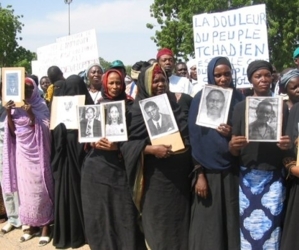
DAKAR, Senegal (AP) — Victims of Chad's ex-dictator may finally have their day in court, as a tribunal set-up to try the former leader is due to become operational in Senegal soon, human rights experts said Monday.
The special court created in Senegal in order to try Hissene Habre, who was exiled here, may start its proceedings later this month, said Reed Brody, a lawyer for New York-based Human Rights Watch.
Senegal's National Assembly is expected to hold an emergency meeting to discuss the case, said Alioune Tine, head of a West African human rights association.
Habre was the president of Chad from 1982 until 1990, when he was deposed in a coup. He is accused of mass atrocities and in 1992, the Chadian Truth and Reconciliation Commission provided evidence indicating he had carried out some 40,000 political murders. He fled to Senegal, and for more than 21 years, the country has dragged its feet on bringing him to justice.
He is seen as a test case for whether Africa can finally try one of its own. All other leaders accused of abuse that have faced proceedings, including ex-Liberian warlord Charles Taylor and former Ivory Coast strongman Laurent Gbagbo, have done so at the aegis of international tribunals, like the International Criminal Court in the Hague.
In Chad, the head of an association of victims under Habre's regime, Clement Abaifouta, said he is anxiously awaiting the trial and feels that he cannot resume his life until the man that he accuses of torturing him is behind bars.
Abaifouta was a student during Habre's reign. He had just won a scholarship to study medicine in Slovakia and was getting ready to leave for the airport, when security forces broke into his house and arrested him. An uncle living abroad had criticized Chad's regime, and Abaifouta said they came for him since they could not arrest his relative.
Abaifouta said he was thrown into jail, and they beat him every day. When his meals were served, guards mixed sand into his food, to make it impossible for him to eat. He was incarcerated for four years.
"I am waiting for one thing only, that he (Habre) be condemned so that I can find my life force again," said Abaifouta. "My life and my future was completely destroyed."
businessweek
The special court created in Senegal in order to try Hissene Habre, who was exiled here, may start its proceedings later this month, said Reed Brody, a lawyer for New York-based Human Rights Watch.
Senegal's National Assembly is expected to hold an emergency meeting to discuss the case, said Alioune Tine, head of a West African human rights association.
Habre was the president of Chad from 1982 until 1990, when he was deposed in a coup. He is accused of mass atrocities and in 1992, the Chadian Truth and Reconciliation Commission provided evidence indicating he had carried out some 40,000 political murders. He fled to Senegal, and for more than 21 years, the country has dragged its feet on bringing him to justice.
He is seen as a test case for whether Africa can finally try one of its own. All other leaders accused of abuse that have faced proceedings, including ex-Liberian warlord Charles Taylor and former Ivory Coast strongman Laurent Gbagbo, have done so at the aegis of international tribunals, like the International Criminal Court in the Hague.
In Chad, the head of an association of victims under Habre's regime, Clement Abaifouta, said he is anxiously awaiting the trial and feels that he cannot resume his life until the man that he accuses of torturing him is behind bars.
Abaifouta was a student during Habre's reign. He had just won a scholarship to study medicine in Slovakia and was getting ready to leave for the airport, when security forces broke into his house and arrested him. An uncle living abroad had criticized Chad's regime, and Abaifouta said they came for him since they could not arrest his relative.
Abaifouta said he was thrown into jail, and they beat him every day. When his meals were served, guards mixed sand into his food, to make it impossible for him to eat. He was incarcerated for four years.
"I am waiting for one thing only, that he (Habre) be condemned so that I can find my life force again," said Abaifouta. "My life and my future was completely destroyed."
businessweek
 Menu
Menu
 Sénégal: L'ancien dictateur tchadien Hissène Habré bientôt à la barre
Sénégal: L'ancien dictateur tchadien Hissène Habré bientôt à la barre
















